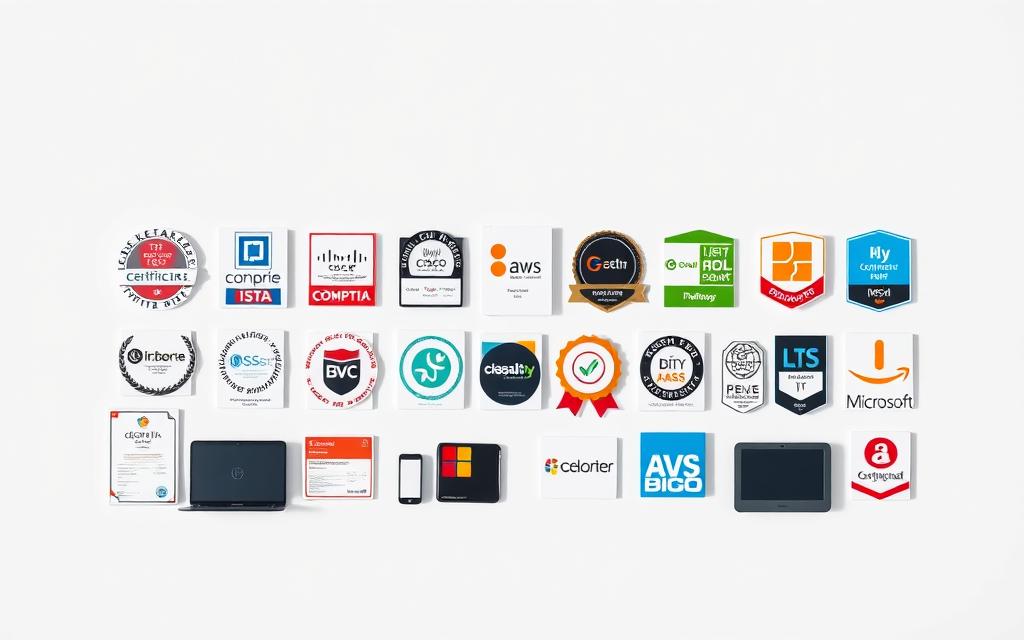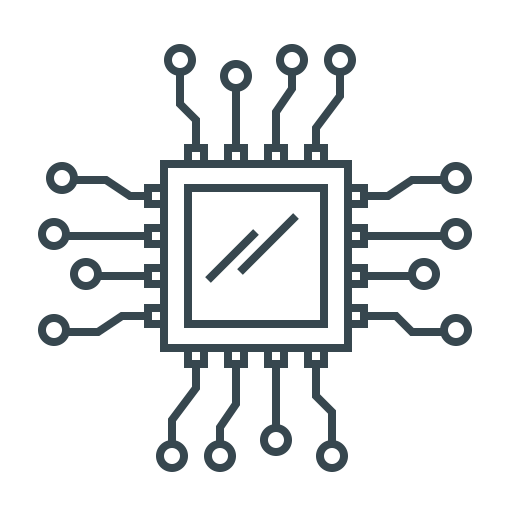The digital world is growing fast, creating a huge need for tech experts. The US Bureau of Labor Statistics says the tech sector will grow by 23%. This shows there are lots of chances to make a career in tech.
IT professionals are key to modern business in almost every field. They help companies use technology well to reach their goals and serve their customers.
These experts do many things like designing systems, managing security, and providing technical support. Their work makes technology useful for both businesses and people at home.
Looking into IT career paths shows a wide range of specialisations. Each one has its own challenges and benefits. This means there’s a place for everyone in the tech world, no matter their skills or interests.
The role of IT professionals is very important today. Knowing what they do helps us understand our digital world better.
Defining the Information Technology Professional
Today’s IT professionals are key to business success. They’ve moved beyond just fixing tech issues. Now, they drive success with new tech and digital changes.
Who is an IT Professional?
An IT pro designs, manages, or supports tech systems for businesses. They use their tech skills to solve big problems.
They work in many areas like software, networks, security, and data. Their goal is to use tech to help businesses grow and work better.
The Evolution of IT Roles in the Digital Age
IT roles have changed a lot over the years. In the 1950s, IT was just about basic data work. Now, it’s much more complex.
Today, IT pros deal with cloud tech, AI, and security. This shows how important tech is in business now.
IT work has become a real career with its own paths and training. This shows how vital IT roles are in today’s world.
Key Industries Employing IT Professionals
Every industry needs skilled IT pros to stay ahead. They’re needed in old and new fields.
Finance needs IT for safe transactions and to fight fraud. Healthcare uses tech for records and telemedicine.
Schools and universities need IT for online learning and admin. Governments use tech for services and infrastructure.
The tech sector itself hires the most IT pros. It’s where new tech and services are made. This sector keeps pushing the limits of what’s possible.
| Industry Sector | Primary IT Functions | Growth Projection |
|---|---|---|
| Finance & Banking | Security systems, data analysis, transaction processing | High growth |
| Healthcare | Electronic records, telemedicine, compliance | Very high growth |
| Education | Learning platforms, network management, support | Steady growth |
| Government | Infrastructure, security, citizen services | Moderate growth |
| Technology | Development, innovation, implementation | Extremely high growth |
IT jobs are everywhere, showing tech’s big role in business. This means there’s always a need for skilled IT pros to tackle tough tech challenges.
What Does an Information Technology Professional Do: Core Roles
Information technology professionals are key to modern businesses. They handle important technical tasks that keep companies running smoothly and safely. Their main jobs cover various areas, each needing special skills and careful work.

System Administration and Maintenance
System administrators make sure computer systems work well and without trouble. They look after both the hardware and software, doing regular checks to avoid problems.
Managing Servers and Infrastructure
Server management means setting up, watching over, and improving server performance. They deal with balancing loads, managing resources, and planning for disasters.
They also take care of data centres and cloud setups. This includes keeping things cool, managing power, and ensuring networks are connected right.
Software Installation and Updates
IT folks plan and set up software across companies. They check if it works with other systems, make installation packages, and update during quiet times.
They also handle security updates quickly but carefully to keep systems stable.
Network Management and Security
Network experts design and keep up communication systems for data flow. They make sure connections are strong and safe from threats.
Configuring Routers and Firewalls
Network engineers set up routers to move data efficiently. They use special protocols and tweak networks for better performance.
They also set up firewall rules to control data flow. They balance security needs with keeping things running smoothly.
Implementing Security Protocols
Security pros create strong protection plans. They use encryption, access controls, and systems to catch intruders.
They also do regular checks to find weak spots. Then, they fix these with new rules and training for staff.
Data Management and Analysis
Data experts manage how information is stored, processed, and understood. They keep data safe, correct, and easy to get to.
They also look after database systems. This includes making sure queries run fast, managing storage, and keeping data reliable.
They turn raw data into useful insights for business decisions. They use stats and visual tools for this.
| IT Role | Primary Responsibilities | Average Salary (USD) |
|---|---|---|
| Network Engineer | Designing infrastructure systems, configuring network devices | $101,388 |
| Security Specialist | Monitoring anti-virus systems, creating firewalls | $109,558 |
| Data Manager | Database maintenance, data quality assurance | $96,782 |
“The modern IT professional must master both technical execution and strategic thinking to address evolving organisational needs.”
These main roles show the wide range of IT skills requirements in today’s companies. IT pros need to keep learning to deal with new tech and threats.
Good IT people are skilled in tech and solving problems. They know how systems work together and affect business.
The changing IT skills requirements show how tech and security are always evolving. IT pros must stay up-to-date to help their companies stay ahead.
Daily Responsibilities of an IT Professional
An IT professional’s day is filled with both proactive and reactive tasks. Each role has its own demands, but common patterns keep organisations running well.
Morning Routines: System Checks and Prioritisation
IT specialists start by checking critical infrastructure. They look at network performance, server status, and security alerts from overnight.
They then sort out which issues need urgent attention and which can wait.
- Checking backup completion reports
- Reviewing system performance dashboards
- Scanning for security incidents
- Planning daily task sequences based on urgency
Troubleshooting and User Support
Fixing user problems and technical issues takes up a lot of time. Help desk technicians, earning a median salary of $61,550, handle hardware, software, and network issues.
Support tasks include:
- Answering queries about computer systems and applications
- Setting up equipment for new employees
- Training users on software functionality
- Diagnosing network connectivity problems
Good troubleshooting needs technical skills and patience. IT pros must explain complex tech in simple terms to colleagues.
Project-Based Work and Collaboration
IT pros also work on strategic projects that improve the organisation. These can be system upgrades, security boosts, or new tech.
These projects often require working with other departments. IT teams collaborate with finance, operations, and marketing to meet business needs.
Key project tasks include:
- Researching new technologies and solutions
- Developing implementation timelines
- Testing systems before deployment
- Documenting processes and configurations
The mix of immediate support and long-term projects makes IT work exciting and rewarding.
Essential Skills for Excelling in IT
Success in IT careers needs both technical skills and soft skills. Technical knowledge is key, but being able to communicate and adapt is just as important. These skills are what organisations value most.
Technical Proficiency and Certifications
Technical skills start with programming languages. Python is very useful for automation, data analysis, and security. Java is key for big projects and Android apps.
Knowing how operating systems work is vital. You need to understand Windows, Linux, and macOS. This knowledge helps with fixing problems and making systems better.

Understanding hardware is also important. IT pros need to know how servers and networks work. This includes storage, processors, and networking gear that keep organisations running.
IT certifications show employers you have these skills. The CISSP shows you know about security. Cisco certifications prove you can handle networks. CompTIA Security+ and Project Management Professional show you can lead and manage.
Programming Languages like Python and Java
Python is great for beginners and experts alike. It’s used for AI, data science, and testing. Many companies want people who know Python.
Java is important for big projects. It’s used for apps and systems. Companies need Java developers for many tasks.
Knowledge of Operating Systems and Hardware
Knowing how software works with hardware is essential. Windows, Linux, and macOS all have their own needs. IT pros need to understand these.
Understanding hardware helps make better choices. It’s about knowing what servers and networks need. This prevents problems and keeps systems running smoothly.
Soft Skills: Communication and Adaptability
Being able to explain technical stuff is important. IT pros need to talk to people who don’t know tech. This helps make sure tech solves real business problems.
Being able to adapt is key in IT. New tech and methods come out all the time. IT pros need to be ready to learn and change.
Good problem-solving skills are a mix of tech knowledge and creativity. The best IT people find new ways to solve problems. Working well with others is also important. This helps teams achieve their goals.
Career Paths and Specialisations in IT
The IT world offers many career paths for different skills and interests. Knowing these paths helps professionals grow in this fast-changing field. Today’s IT industry trends show both old and new specialisations.
From Help Desk to Senior Roles
Many start at help desk jobs. These roles give vital experience in fixing problems and helping users. This experience is a stepping stone to more technical jobs.
Typical career progression includes moving from help desk to system administrator or network engineer. With more experience and certifications, you can reach senior roles like:
- IT manager or director
- Systems architect
- Cloud solutions engineer
- Senior security analyst
Each step up needs more technical knowledge and leadership skills. Keeping learning is key at every stage.
Growing Fields: Cybersecurity and AI Integration
New fields offer great chances for specialisation. Cybersecurity is a fast-growing area. The US Bureau of Labor Statistics says it will grow by 32% for information security analysts.
These roles pay well, with a median salary of $120,360. This shows how much companies need their skills. Cybersecurity jobs include:
- Security consultant
- Penetration tester
- Security architect
- Incident responder
AI integration is another area growing fast. Companies want people who can use artificial intelligence. This job needs both technical skills and business smarts.
Other areas like cloud computing, data science, and IoT development also offer great chances. These fields are open to those ready to learn new skills.
Keeping up with IT industry trends helps professionals grab these chances. The field rewards those who keep learning and adapting.
Conclusion
Information technology professionals are key to modern business. They keep systems running and data safe. Their work helps businesses stay ahead in the digital world.
IT jobs pay well, with median salaries around $97,430 a year. Roles like support specialists earn about $59,177, while IT directors make up to $165,786. This shows how much value companies put on IT skills.
The demand for IT workers is growing. There are many career paths, from help desk to cybersecurity and AI. IT jobs offer flexibility, diverse work environments, and chances to learn new things.
To succeed in IT, you need to plan your education and certifications. A degree in computer science or IT is a good start. Certifications from Microsoft, Cisco, or CompTIA prove your skills. Keeping your skills up to date is key for moving up in your career.
FAQ
What industries employ IT professionals?
IT professionals work in many fields. These include finance, healthcare, education, and government. They also work in the tech sector itself. Every industry needs skilled IT workers because technology is key to modern business.
What are the core responsibilities of an IT professional?
IT professionals handle system administration and maintenance. They also manage networks and data. Their tasks include managing servers, setting up firewalls, and ensuring data is safe.
What does a typical day look like for an IT professional?
A typical day starts with checking systems and monitoring networks. They then solve user problems and support their work. IT pros also work on projects, like setting up new systems, with their teams.
What technical skills are essential for IT professionals?
Key skills include knowing programming languages like Python and Java. IT pros also need to know about operating systems and hardware. They should have certifications like CISSP and CCNA Security. These skills help them do their jobs well.
What soft skills are important for success in IT?
Important soft skills are communication, adaptability, problem-solving, and teamwork. IT pros need to explain tech to non-tech people. They must also keep up with new tech and business needs.
What career progression opportunities exist in IT?
Careers start with help desk tech roles. Then, they move to system or network admin positions. With more experience and certifications, they can become senior or leaders.
What are some growing specialisations in the IT field?
Cybersecurity and AI are growing fast. Cybersecurity is expected to grow by 32%. Roles like information security analyst have a median salary of 0,360. AI is also growing as businesses use it more.
What certifications are valuable for IT professionals?
Valuable certifications are CISSP, CCNA Security, CompTIA Security+, and PMP. These show expertise and improve career chances in IT.
How has the role of IT professionals evolved over time?
IT roles have changed a lot. They’ve moved from simple computer work to areas like cybersecurity and data science. This change shows how important technology is in business and life today.
What is the job outlook and earning for IT professionals?
The IT job market is growing by 23%. Salaries are competitive, with a median of ,430. Earnings vary from ,177 for support roles to 5,786 for directors, based on experience and specialisation.







